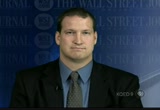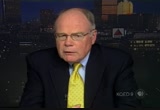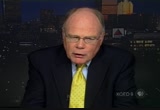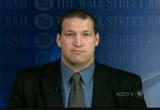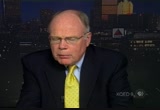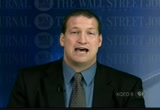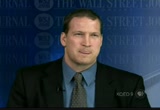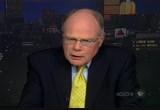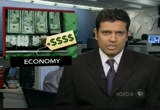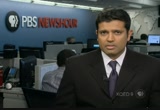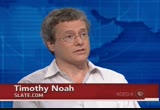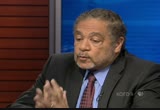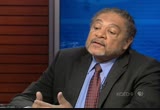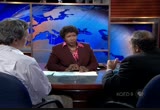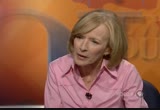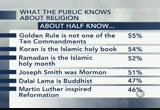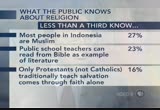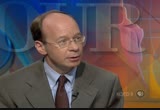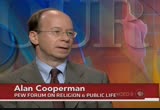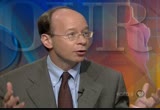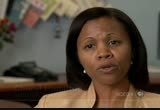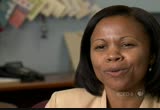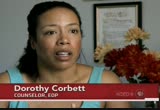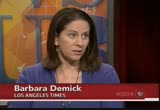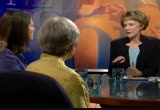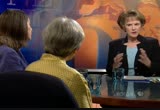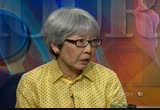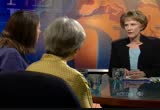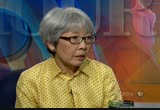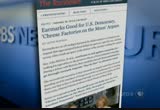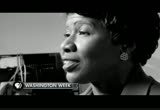tv PBS News Hour PBS September 28, 2010 3:00pm-4:00pm PDT
3:00 pm
captioning sponsored by macneil/lehrer productions >> brown: good evening. i'm jeffrey brown. housing prices showed signs of stabilizing in july, but worries remain in many parts of the country. >> ifill: and i'm gwen ifill. on the newshour tonight, jack hough of "smart money" magazine and karl case of wellesley college weigh the pluses and minuses of home ownership. >> brown: then we look at the record income gap between the richest and poorest americans. >> ifill: judy woodruff talks to alan cooperman of the pew forum on religion in public life about what americans know and don't know about religion. >> brown: special correspondent john tulenko reports on a college program that's raised graduation rates for minority students.
3:01 pm
>> some of these kids have lives that are so complicated that they need a lot more. that's what we do. >> ifill: and margaret warner speaks to two analysts about north korea's latest succession drama. >> brown: that's all ahead on tonight's newshour. major funding for the pbs newshour has been provided by:
3:03 pm
and by contributions to your pbs station from viewers like you. thank you. >> brown: on the surface, today's housing news looked pretty good. it came from a closely watched report on property values known as the case-shiller index. the survey found home prices rose in july for the fourth straight month. in all, a dozen cities out of 20 reported gains, while seven were down. one was unchanged. but that was partly because home sales were boosted by a federal tax credit that has since expired. president obama addressed the housing issue today. speaking in albuquerque, new mexico, he urged potential buyers to be prudent. >> if you want a house, you have to save for a while. you have to wait until you have 20% down. you should go for a mortgage that you know you can afford. you've got... there shouldn't be any surprises out there, right? that kind of traditional thinking about
3:04 pm
saving and thinking about the house not as something that is always going up 20% every year and you're going to flip and take out home equity loans and all that, we have to have a different attitude which reflects what you talked about, more of an attitude that this is your home. this is not just a way to make quick money. >> brown: and for more, we turn to karl case, who helped develop the case-shiller index of home prices. he's professor-emeritus of economics at wellesley college. and john hough, columnist and associate editor for "smart money" magazine. carl case, what i think people want to know is whether home prices have hit bottom. what do the latest numbers suggest? >> well, there's mixed evidence. you have to go back and look at a little history first. we had a big, huge run-up in house prices starting in about the year 2000. it peaked in 2005 and 2006. and since that time they've been falling like a rock. until about a year ago. about a year ago they perkd up. it happened to coincide with
3:05 pm
the enactment of the tax credit and the very low interest rates that were caused in part by the fed buying up mortgage-backed securities. so now you have to try to sort out what is going on. actually we had a little pause. housing prices have stopped falling now, have stopped falling, and it's hard to know exactly whether they're going to continue to fall or resume their stay up. i think that we've reached the bottom. on one of the wildest optimists in the world having said that. i think there's good reasons why we've hit bottom. although there are a lot of worries left. >> brown: tick off some of those factors that give you some reason for optimism. because the recent home sales were not very good. >> no, the home sales figures the first month out were down. but if you take a look at a
3:06 pm
house today it's 33% lower on average in price than it was five years ago, four years ago. in addition to that, mortgage rates are at 4.1%. if you think of it as a consumer durable good it's got a yield or a benefit that accrues to you from owning it that basically is tax free. it's about 6%. so if you look at it from the standpoint of a buyer, ignoring all the... and understanding that it doesn't take a lot of people to move the market, i mean, we sell about 5% of the stock in a given year. you don't have to value all of it. you need enough people who are optimistic to look at the environment and make a move. i think that's beginning to happen . >> brown: jack, that was a fairly positive view of things. plenty of people see things staying or getting even worse. how fragile do you think things are? >> well, i'll agree that the worst of the price plunge is over. i mean how could it not be? but i think that we could easily be in for a long period,
3:07 pm
maybe a ten-year period of disappointing returns. i'm talking about prices that lag behind the rate of inflation. you know, we humans tend to have very short memories when it comes to our money and our investments. as the president indicated a little while ago people are going to think if house prices are rising gradually now maybe we're getting back to the 10 or 20 percent yearly gains. maybe it's time to go all in on a giant house and try to cash in. we need to remember what the normal return for the single- family housing market looks like. what it looks like is the rate of inflation. how could it not? inflation is almost by definition a rise in the price of ordinary goods. what is a house if not an ordinary good? it's sticks and cement and metal. it doesn't sit up nights thinking about ways to make itself more valuable. it just sort of sits. so houses tend to, you know, correspond with the rate of inflation. i think there are still pockets around the country where house prices are
3:08 pm
relatively high. so i think we could easily see a long period where prices... they don't plunge but they just slightly lag behind inflation. >> brown: i want to ask both of you this because the experience of the last few months has led to a lot of questions about the value of home ownership. carl case, i'll start with you. questions now about people asking themselves is it better to still buy or to rent? what are the factors that should go into that? >> one way of thinking about it is to think of a house as a durable good to begin with like a car. first of all you don't worry a lot if your car declines in value. you know it is going to. people have to think that you live in it rent free. that's not non-taxable. it represents about a 6% yield. in today's environment with a 1% on what you put it in that's safe, it's not a bad... it's not a bad return. so i just think if you start
3:09 pm
adding in some of those factors, it comes out a little bit differently. also if your house falls in value but you're living in an area where it falls somewhat in real value, then if you're going to live in it a long period of time you get the continuous flow of dividend at about 6% and you're still able to purchase the next house in the chain as you go along. it's not such a bad deal. >> brown: jack, you've written recently in praise of renting. now what's the argument there? we ought to say that these things, i suppose, depend on where one lives and how one lives but explain the case by renting today. >> absolutely. you know , there's nothing wrong with buying a nice house any more than there's nothing wrong with buying a nice car. it's just that there's too much talk of single family housing as an investment. if the three of us decided to
3:10 pm
go in together on a real estate investment and i said i have a plan. we'll build a 3,000 square foot house that will fit only one family you would say to me that's not a very good plan. we should bill a building where we can maximize the amount of rent that flows through it and have people with just as much living space as they need. the single family house in america is a poor investment by design. go back 30 years and you had houses that were 1700 square feet. today they've come down over the past year a little bit but they're still 2400 square feet own though the size of the average american family has gotten smaller over that time. clearly houses today are mostly consumption. they're not designed for investment. there's nothing wrong with home ownership. just don't go into it thinking you're going to get rich. go into it because you have a lot of money and you want something nice. >> brown: carl case, what do you think about that? >> i agree with that. there are negative surprises that happen when you buy a home too. i mean, you don't realize that it's like running a small business.
3:11 pm
many of the properties we sold for exorbitant prices over the last three or four years were in low-income neighborhoods where people got access to credit. they paid unbelievable prices for these houses. they weren't in very good shape. so if you can't afford it and you don't anticipate all that goes into maintaining it properly, then you should be a renter. if you're only going to be around for a short period of time where you're living i think it's always a bad time to buy because you want it to be liquid when you need to move. it's not always hick wid when you need to move. >> brown: the longer-term questions here are, you have people asking themselves now is whether the whole notion of home ownership has been oversold. you know, oversold by the government. oversold by our culture through public policies whether we ought to be rethinking those. give us a flavor of that argument now. >> i don't know if home ownership has crossed over the line where it has become a religion or not. i'm not sure what the barrier
3:12 pm
there, but i don't understand why we have government making such a sales pitch for home ownership. why do we give such tax breaks and sufficient incentives to people who own the box they live in and take the money out of the pockets of people who rent the box they live in. why are we telling americans that single family housing is such a great investment? if it's such a great investment, shouldn't they see that on their own? i think it's time for a close examination of many of these programs we have. certainly the $,000 give-away that expired was a bad idea. but i think going forward, we can reconsider not very existing home ownership sort of bought on these terms but for new buyers, why do we give a mortgage interest deduction, why do we give a cash reward for people who buy their homes with borrowed money and not for people who pay cash and people who rent. >> brown: we just have a minute here. carl case, do you want to make a case for the continued value
3:13 pm
of home ownership? >> i think making a case for continued value of home ownership is different than looking for a huge federal handout. we pour hundreds of billions of dollars into housing as a result i think of very effective lobbying over the years. and the fact that people made enormous sums of money living in their houses so i do think we need to reexamine the way we give subsidies and rental housing is an important component of the stock simply because ownership is not really right for everybody. >> brown: okay. i'm sorry. did you want to finish? >> no, that's all right. >> brown: okay. carl case and... go ahead. >> i would just say keep in mind when you buy this big giant house with a small downpayment that you don't pay your property taxes on the money you've put up for the deal. you pay it on the total purchase price of the house. that's a big consideration by policy makers when it comes to pushing the benefits of home ownership. there are benefits of tax revenue.
3:14 pm
>> brown: okay. jack hough and carl case, thank you both very much. >> thank you. >> ifill: we've have another economic story coming up. >> ifill: we have another economic story coming up, the widening gap between the rich and the poor. that's followed by surprising news about what americans know about religion; a push to get more minority students to graduate from college; and talk of a change in leadership in north korea. but first, with the other news of the day, here's hari sreenivasan in our newsroom. >> sreenivasan: u.s. consumers and business executives alike have turned more pessimistic about the future. the business research group conference board reported today that consumer confidence is now the lowest since february. and a new survey by the business roundtable found c.e.o.'s are less hopeful about future sales than they were in june. but on wall street, the september rally resumed. the dow jones industrial average gained 46 points to close at 10,858. the nasdaq rose more than nine points to close at 2379. president obama stepped up his efforts to energize supporters, with mid-term elections just
3:15 pm
five weeks away. he spoke in the yard of a family in albuquerque, new mexico, and he warned republicans would undercut any progress democrats have made on education. separately, in an interview with "rolling stone" magazine, the president urged democrats to go to the polls in november. he said, "people need to shake off this lethargy. people need to buck up." former president jimmy carter became ill today as he flew to cleveland for a book signing event. mr. carter was taken to a local hospital for overnight observation. a grandson said he had a stomach bug, but was doing fine, and planned to continue his tour tomorrow. the former president turns 86 years old on friday. in afghanistan, a suicide bomber assassinated a deputy provincial governor. the bomber rammed a motorized rickshaw into the official's vehicle, as it drove to his office in the eastern province of ghazni. five other people were killed as well. later in kabul, president hamid karzai made a tearful appeal to end the violence.
3:16 pm
>> i swear i feel the pain. i'm scared. i'm scared that maybe my son will flee afghanistan and abandon the country and become a foreigner. for the sake of god, stop the fighting. i don't want my son to be a foreigner. >> sreenivasan: shortly after the attack, the afghan government appointed 70 people to a new high peace council. it will try to reconcile with taliban leaders and militants who renounce violence. across the border in pakistan, intelligence officials reported a u.s. drone aircraft killed four militants with a missile strike near the afghan border. the news came as reports surfaced that the c.i.a. has drastically stepped up the attacks with more than 20 so far this month. pakistani officials said al qaeda's regional commander was among those killed this week. a landslide buried up to 300 homes in a village in mexico overnight after weeks of heavy rain. it happened in oaxaca state, southeast of mexico city. at least seven people were confirmed dead, with 128 missing.
3:17 pm
heavy rains also triggered a deadly mudslide in colombia on monday. amateur video showed a mountainside collapsing. 30 people were killed, and rescue officials said today it will take at least a week to recover the bodies. there was good news today about the global fight against h.i.v., the virus that causes aids. in poor nations, just over half of infected pregnant women received drugs to protect their unborn children last year. the world health organization reported that as a major improvement from five years ago, when only 15% of such women had access to the drugs. still, the report warned that most people living with h.i.v. don't know they have it. those are some of the day's major stories. now, back to gwen. >> ifill: next, a look at the growing problem of inequality in america. a new analysis out today showed the recession magnified the gap between the richest and poorest to the widest margin since the census began counting. last year, the top fifth of americans, who earn more than $100,000 a year, received nearly 50% of all income in the u.s., while the bottom 20% received just 3%. the u.s. also has the greatest
3:18 pm
disparity between rich and poor among western industrialized nations. we look at that gap and what's driving it now with writer timothy noah, who just completed a series on the topic for slate magazine. and howard university professor roderick harrison, who studies census data for the joint center for political and economic studies. tim noah, you write in slate about the great divergence. describe what you mean. >> really it's a three-decade trend that began in the late 1970s. a trend towards income and equality. incomes have been growing less and less equal since 1979. a lot of people accept that as the norm but in fact for much of the 20th century, the trend was going the other way between 1929 and the early 1970s incomes were becoming more and more equal. in the middle of that period you had a great deal of prosperity after world war ii. >> ifill: professor harrison, what is the cause of this?
3:19 pm
>> the underlying cause is that the gains in productivity have been divided more towards corporate earnings and profits than towards the workers and employees. we've maintained the historical levels and share of sharing productivity gains . the middle- and lower- income portions of the income distribution would have fared much better and you wouldn't see this acceleration in the gap. >> ifill: but we didn't maintain it. what was the reason for that? >> again, you have a gain productivity. you're producing more per worker. if that goes primarily to profits, which it has in recent decades , wages are not increasing due to that gain in productivity.
3:20 pm
the workers, the employees are not benefiting from it. wages and the earnings have in fact stagnated over much of this period. if more of that had flowed to the large number of people in the work force, you would have had some increases. we've had great increases in productivity. we have much greater increases in the earnings and wages and much less of a gap. >> ifill: tim, we're coming out of or according to some numbers out of a recession but people feel like they're still in one. is that the cause or the effect of this kind of divergence we see? >> the divergence has been going on very long time. the divergence doesn't have anything to do with the recession. it does appear that during this recession what we have seen is the new at least short- term, one hopes short-term effect which is a huge surge in the poverty rate. we haven't seen an increase like this since the mid 1990s.
3:21 pm
>> ifill: so the recession exacerbated a situation that already existed? >> exactly. what the trend has been since the early 1990s has been that income at the top has just been skyrocketing. the top, we're talking about the top 1% and especially the top 0.1%. emmanuel scez did pioneering research on this at berkeley. >> ifill: he found exactly the same thing? >> he found, yes, he was the one who... this went unnoticed for a long time because social sign tiffs were looking at census data which is not very resize. two men looked at i.r.s. data and were able to get a much sharper picture of this increase. >> ifill: professor harrison, can we talk about the demographics of this? who is affected the most? is it a urban versus rural construct, male versus female, racial? >> if you look over the three or so decades, clearly most rural
3:22 pm
areas have been left out of the economic growth of the country particularly during the '90s, that great expansion. that great expansion left many of the areas behind. some of the sharpest differences are between the less well educated and the college educated . college educated have shown gains and particularly where you have college educated husbands and wives, mothers and fathers, those families have gained the income opportunities for less well educated workers have not kept pace. >> ifill: another part of this-- and a lot of people have talked about this education gap. people have talked less about or at least there have been assumptions made about immigration as an effect or trade policy. jobs are being outsourced to other countries. is that part of this as well? >> well, immigration as far as economists have been able to
3:23 pm
determine so far, immigration has not been a major factor. it has, except with regard to the very poor. the bottom 10%. high school people who did not graduate from high school have suffered. as a result of immigration. but the middle class , whose income stagnation is really the defining factor of what i call the great divergence, i borrowed that from paul krugman of princeton and the "new york times", that was unaffected by immigration. >> ifill: how about taxation? there's a lot of discussion now, we've been having it on this program about the effect of taxes, raising them, lowering them, on people's well being. is that also driving this divide or is there any evidence to suggest? >> the bush tax cuts, particularly the debate over the top 2%, certainly increases some of this but it's not.... >> ifill: that's just in the
3:24 pm
last two years? >> it's not the diving force exactly. this has been going on for decades. independently of tax policy. it's part of really the restructuring of the economy. there is one thing i'd like to mention i think that is very important. the relationship of this to the recession might be robert reich is making this argument , the suppressed incomes of lower and middle income people meant that people were maintaining their living standards by credit. borrowing. that was unsustainable. that's part of the difficulty with climbing out of the recession is these relatively flat incomes. >> ifill: if this is a trend which is now decades long, this widening gap, is it an arrestable trend? is there some policy or some personal responsibility that people need to take to dig themselves out of this kind of hole? >> it's hard to point to any one individual thing.
3:25 pm
obviously improving the education system would help because we really need to be producing more high school graduates than we're producing. the work force doesn't seem to be meeting the education level required of employers. but i know this sounds glib but electing dem krasess to the white house seems to help. there was a very interesting study done by a princeton political scientist where he looked at administrations going back to 1948 and he found exact opposite trends. >> ifill: because of government policies? >> because of a whole range of government... too many to count. a whole range of government policies. dem democrats were much more favorable to people of lower incomes than republicans. >> ifill: what do you think can arrest this trend? >> i think the distribution of increases in productivity is the key. we have had good, substantial gains in productivity. if we maintain those but if we distribute the been anys of
3:26 pm
that more widely across the work force, you would start to see a leveling out of or a return to the prior levels of inequality. that would give consumers, broaden the consumer base. >> ifill: professor roderick harrison and tim noah from slate magazine, thank you both very much. >> thank you. >> thank you. >> brown: now, how much do americans really know about religion? judy woodruff gets some answers. >> woodruff: there's no doubt that faith and religion play a large role in american life. but a new survey out today shows that americans' basic knowledge about their religion and others is somewhat lacking. the pew forum on religion and public life posed 32 questions to more than 3,400 americans. some were very basic: who was moses?
3:27 pm
where was jesus born? others required a deeper understanding, such as the name of the figure who inspired the protestant reformation. the results were surprising: people got roughly half the answers wrong. atheists and agnostics scored best. jews and mormons scored highly as well. we discuss these findings now with the pew center's alan cooperman, who did the survey. thanks for being here. >> great to be here. >> woodruff: let's start with what people do know. tell us what some of the answers were that most people got right. >> well, the bible and the constitution, judy, americans, about two thirds of the americans know that the constitution says that the government shall neither establish a religion nor interfere with the free exercise of religion. two-thirds or more americans seem to have passing at least familiarity with major bible stories. as you said most know that moses is the biblical figure associated with the exodus from egypt.
3:28 pm
about 70% know that jesus was born in bethlehem according to the bible and not jerusalem or nazareth. about 60% correctly associate abraham with willingness to sacrifice his son for god in the bible story. >> woodruff: now let's talk about some things that people didn't tend to know. i think we have a graphic here. some of the questions that you indicate about half people knew the answers to. >> yeah. well, to begin with, the ten commandments. we asked a question which of the following is not among the ten commandments? do not steal, do not commit adultery. keep the sabbath holy or do unto others as you would have them do unto you. a little more than half the public 55% correctly said do unto others as you would have them do unto you rule, the golden rule. but fully a quarter of americans, a little more than a quarter of americans think keep the sabbath holy is not
3:29 pm
among ten commandments and do unto others as you would have them do unto you is. >> woodruff: that's what people got about half right. now there are questions i want you to share with us a couple of examples of only less than a third of americans knew the answers to. >> you know, one of these is how, you know, is about the largest islamic nation in the world, indonesia. only a quarter of f americans know that most people in indonesia are muslims. at a time when islam is very much in the news, when barack obama spent some of his youth in indonesia, you would think it might be higher. less than a quarter of americans know that. questions about religion in public schools very interesting. the highest single response rate that was correct on any of our questions was to a question under the supreme court rulings can a teacher lead a class in prayer? nearly 90% of americans correctly said no. in a public school a teacher cannot lead a class in prayer.
3:30 pm
but on a similar question, can a teacher read from the bible as an example of literature? most americans also say no. incorrectly. >> woodruff: alan cooperman, what should we take away from this? why do you come away from this with theories about why people don't know as much as we think they should or do. >> a whole variety of ... on the public school question people think there are greater restrictions on the teaching of religion of public schools in the united states than their really are. on some of these other questions it's hard to know. one of the interesting things is who does better and who does worse? you noted that atheists and agnostics, jews and mormons come out on the top. athee i haves and agnostics are only about 4% of the population. they're a tiny fraction. they're people who self identify in our survey. they called themselves
3:31 pm
atheists and agnostics. my hypothesis is that people who self-identify people as atheists and agnostics are people who pay a lot of attention to religion. 75% of them were raised as questions. it's were raised as christians. people who self-identify are people who care quite a bit about religion. maybe that's why they do better. >> woodruff: should we draw any broader conclusions about how much people really understand about their own faith? >> well, there are some questions in here that would indicate if i were a religious educator i might be concerned. about how much people know about their own faith. it's harder to for me to say, i have no basis on what to say how much people should know about somebody else's faith. to be a good citizen in this word, yes, maybe that argument could be made. just as an example on roman catholicism, it's only about half of roman catholics who can correctly answer a
3:32 pm
question about the eucharist, the communion, the bread and the wine used in communion. so nearly half of roman catholics incorrectly say that the church's teaching is that the bread and wine are merely symbolic of the body anded blood of christ. among church of going catholics it's a little higher. maybe ish say transsubstantially higher. 55% of them or 65% of them get the eucharist question right but still nearly half of catholics, a third of church- going catholics get that question wrong. >> woodruff: so much that you overhear, so much to look at. it's a survey worth looking at. alan cooperman with the pew forum on religion and public life, thank you very much. >> thank you, judy. >> brown: pbs viewers can soob learn more about the history of >> woodruff: pbs viewers can soon learn more about the history of religion in american life. a new "frontline"/"american experience" documentary explores that on three consecutive nights beginning october 11.
3:33 pm
>> ifill: next, trying to raise graduation rates for students of color on college campuses. the obama administration is convening a summit next month to try to find fresh approaches to that concern. we have a report on a program that's getting some good results now. special correspondent john tulenko reports for learning matters, which produces education stories for the newshour. >> reporter: this fall about a million-and-a-half students started out at four-year colleges and universities. unfortunately if patterns hold, six years from now only about half will have graduated . it's much worse for black and latino students. only 40% graduate. but some colleges do better. this is one of them. the state university of new york at stonybrook. a diverse school with 16,000 undergrads, stonybrook graduates 65% of its latino
3:34 pm
students and 70% of its black students, more than almost any other public university in the country. key to its success is a special program that helps some 600 low-income mostly minority students make it to graduation. it's called e.o.p., for educational opportunity program. cheryl hamilton is the director. >> students who come through the program are students who might not otherwise have the opportunity to go to college. many of our students are not just first-generation college students but we have many students who are first generation americans. >> reporter: like 23-year-old jose gibson. born in guyian a he moved to the united states at age 10. >> just came over to the united states. we just wanted to survive. my mom had to find a job. my dad had to find a job. we also had to find our own apartment. >> reporter: his family settled in upstate new york. his father worked as a
3:35 pm
security guard. his mother cleaned in a hospital. and jose went to public high school. was college part of your thinking then? >> college was not in the plan at first. i didn't see it happening. i didn't think i was going to make it this far. >> many of our students come from communities where they're not seeing a lot of people coming out of those communities who are professionals. they don't have folks in their corner saying this is what you need to do. oh, how exciting that you're studying engineering. maybe you can come and work for my firm during the summer so you can get some hands-on experience. our students are not getting that. >> reporter: so to get these students to graduation stone a brook uses a three-part approach. part one becomes the summer before freshman year when 125 students, many needing to catch up academically, arrive on campus for five weeks of college boot camp. >> boot camp.
3:36 pm
i was shocked. pretty strict guidelines. one thing that struck everyone's attention as soon as we got there was they took away all our cell phones. no cell phones. people cried. oh, i've got to call my mom. i've got to do this. that was big. >> reporter: students are in classes all day. at their desks until well into the night. >> mandatory study hours. that was new to a lot of people. you had to study. we would have a pair of tutors patrolling the hallways making sure you were at your desk. in that four hours you could not be sleeping or even conversing. >> it really does feel like a boot camp. >> well i think if we just leave the students on their own to study when they feel like studying and leave them with their cell phones, i suspect that probably not a lot of work would get done.
3:37 pm
we have a group of students who don't even think it's possible for them to sit at a desk for four hours. just helping them to understand that they can, helping them to realize that it is possible. it's not easy. the interesting thing is once the academic year starts and there's no longer a curfew and they're allowed to have their cell phones and, you know, the rules are so much more relaxed, students are still giving themselves those four hours of mandatory study per night. the students who do that are our students who are the most successful. >> reporter: if students do fall behind they get free tutoring. those in more serious academic trouble take a mandatory six- week long study skills workshop. that's part 2. >> we have all of our students, any student whom we identify as being at risk sits down with their assigned academic advisor and develops what we call an academic success contract. so the counselor and the
3:38 pm
student would come up with, well, this is what we think this student needs to do in order to bring their grade point average from here to here. >> reporter: but sometimes even that's not enough. so next comes the heart of the program, part 3. >> you can talk to me. tell me your needs. tell me if you're home sick. tell me if you think you need more time on the phone. whatever it is that you think you need. >> we concentrate on the person, the whole person. we make them think, what are you like? you told me this about your missouri and your brothers and sisters and your upbringing. let's really look at at your person and find out what is going to make you happy and successful as an adult. >> reporter: every student in e.o.p.has a counselor like dorothy corebet. they're required to meet that person four times a semester. a student dorothy came to know very well was this person. in the spring of her first year she had a crisis. >> i think i saw her in the hallway crying. if i remember correctly.
3:39 pm
and i pulled her into my office and said what's going on. >> my mom used to, i guess, battle with alcoholism. obviously when you battle with alcoholism, you have the denial stages . the person becomes a different person. i went back home and the door was locked. >> she was distraught. she said she didn't know what she was going to do. she told me her mother had kicked her out. >> i'm crying. i'm like crying in the office. >> so i started letting her know, okay, you need to calm down. i'm going to help you. it might not be today. but before this summer comes you will have a place to stay. >> reporter: and she did. that summer she lived on campus. afterwards, she stayed there year round. >> some of these kids have lives that are so complicated that they need a lot more. that's what we do. the way we are in this apartment, we're going to find a way to help you. >> please rise.
3:40 pm
>> reporter: it worked! she graduateded this spring. but many other students here still need a lift. stonybrook's overall graduation rate averages to around 60%. >> these special services, why don't you do this for all your undergrads? >> i would love for everyone to get it. the challenge is we don't have the resources to do it. >> reporter: instead of expanding e.o.p., stonybrook's president dr. samuel stanley is looking for ways to save it. since 2008 new york state has cut funding for the program by 17%. >> i work very hard to defend e.o.p. it should be part of our core mission to fulfill this concept of the american dream. if we don't have these kinds of examples where people have been successful then i think you're caught essentially and so communities can be caught in a cycle where no one has succeeded or there's been very little success. i think it becomes incredibly important that we provide these kinds of success stories because i think other people build on them.
3:41 pm
>> reporter: that's the hope for graduates like jose. he plans on becoming a nurse. and this girl started graduate school in social work this fall. >> brown: finally tonight, picking a crown prince to run north korea's closed society. we start with a report narrated by john sparks of independent television news. >> reporter: now the evening news from pyongyang. no mention of increased tractor production. instead the news reader spoke of a crucial development. the general meeting of the workers party of korea was underway. members of the ruling party have been descending on the capital for the big event. the state broadcaster, well positioned to capture their rather orchestrated arrival. north korea's leader kim jong
3:42 pm
il convened a rare general assembly to tackle the trickyiest of succession issues keeping dictatorial power in the family. outoutside the hall the cameras caught the air of celebration, a celebration of continuity for the dear leader has picked one of his three sons as his likely successor, promoting him to the position of four star general. the news was reported with conviction. and here he is. kim jong-un at 11 years old. he was educated at this swiss school is now thought to be 26 or 27 but little else is known. this one view from south korea . >> he's young and charismatic. we heard that he holds meetings and he doesn't let others talk. >> reporter: the founder of north korea kim il sung also known as the great leader died
3:43 pm
in 1994 and his son kim jong il the dear leader took over. he's been looking frail of late. he has three sons kim jong- num and the youngest kim jong-un now called the young general. he'll be rivaled by the sister. she was also made a general today. her husband is regarded as a powerful political figure. in fact, some say her husband is better positioned to lead because of his relationship with the military. the country is afflicted with chronic food shortages and its nuclear weapons program condemns it to international isolation. >> brown: late today, north korea's official news agency reported kim jong oon was also named vice chairman of the central military commission of the ruling workers party. margaret warner takes the story from there. >> warner: for more on the apparent succession moves in north korea, we turn to kongdan katy oh, a korea specialist at the institute for defense analyses. she is the author of "the hidden
3:44 pm
people of north korea." and barbara demick, beijing bureau chief for the "los angeles times." she's the author of "nothing to envy: ordinary lives in north korea." welcome to you both. barbara, let me begin with you. what do you make of this news today? i mean, is this now... is it clear, do you think, that kim jong-un is going to succeed his father or is it murkier than that? >> i think it's clear that kim jong-un is daddy's favorite. no doubt about that. he's beaten out the brothers. nobody knows until kim jong il dies. this is a boy who nothing is known about until yesterday his name had never appeared in the north korean press. we don't even really know how to spell it. they say sometimes u-n.... >> warner: they changed the spelling today. >> you had two different ones on the prompter. i'd ask katy about that. the only photograph of him
3:45 pm
shows him at the age of about 12. so he's the man without a name. the man without a face. something that i've been hearing in china-- i'm based in beijing-- is that even in north korea, there are some rules for legitimacy within the party one needs to establish credibility and presence. so i would not say he's the successor. i would say he's daddy's favorite. >> warner: not a done deal. do you think katy-oh, you can read this as expressing kim jong il's wish? and if so what explains the appointment of his sister as a general? what is that all about? >> i think i would make a little bit different approach. i think king jong ewen. >> warner: the son? >> i think he is is designated successor. appointing him as general, at the same time the vice chairman of the central committee basically the
3:46 pm
crystal clear that kim jong il has anointed him as the successor. why? because he is too young. behind this young puppy they need a regent who will take care of shielding him from any kind of power struggle until he has a power of transition. yesterday and today was the day of the third generation succession completed in north korea. that's my view. >> warner: now the sister. we talk about her being the regent. if this presumes that the current leader might die fairly shortly while this young man is still very young. is that the scenario under which she would be regent. >> it looks like it. they've put this whole thing into fast for. kim jong il himself was named... was at this point in 1980 when he was 38 years old. then he had another 14 years before his father died.
3:47 pm
it had also started in the 1970s. >> warner: he a lot of seasoning in the way that his son will not unless the father lives a long time. >> exactly. i think it was in the 1980s that people started seeing photographs of kim jong il, north koreans have these mandatory photographs, the father and the son, on their walls. nothing else. but this is all in fast forward. so we are assuming that kim jong il is in very poor health. otherwise why would they be going so fast? >> warner: do you agree with barbara, katy-oh, that there is almost nothing known about kim jong-un the son, that is, nothing that would help us assess what it might mean for korea, what it might mean for korean-american relations? >> well in a sense that's true. because so far starting from the 2007 and 2008, a lot of north korean analysts paying attention to the succession politics,
3:48 pm
and the third son and basically what kind of works they do and what kind of positions they are getting. kim jong-un was already in the party works. >> warner: can the father do this by fiat? >> i think that the speed and this incredible style of approach naming the 27-year-old boy who hasn't served a single day in the army overnight he's a four star general basically telling us that kim jong il is on a running treadmill. his days are limited and he has to push this issue very fast. regardless of whether he is well groomed or ready. that's the reason they need a regent. >> warner: barbara, is there no rival power center? in other words, the fact that the son was given military appointments? does that mean the military is behind this and the elites are behind this?
3:49 pm
>> i hate to say this on television but i don't know. >> warner: that's very refreshing. >> i don't think we know. is there an internal power struggle? very possibly. yes. if i were in the military, i don't know that i would be so happy about a 27-year-old leader-son. >> warner: you've done a lot of reporting based on north korean sectors. it's fair to say if he takes over any time soon he's going to inherit a country in far worse shape than his father inherited? >> the country was in bad shape when his father inherited it. but the leadership was still in good shape. people really loved kim il song, even defectors i talked to have reverence for him. kim jong il has never been that popular. years now of famine and deprivation, people, i don't think, believe in the same way they did.
3:50 pm
i've talked to defekors and people have said to me... actually i talked to north koreans working in china so they're not really defectors. they said if his father runs the country this way, what can we expect from the son? >> warner: does the opinion of the people matter? >> well, i think the most interesting changes since the 1990s that killed... the famine that killed up to three million is the so-called common ordinary people awoke from the nightmare basically. the state is not reliable source of our income. they don't take care of us. so we better feed ourselves. now through porous borders and the defectors from north korea, maybe up to 20,000 in south koreas, basically north koreans are learning that they have to change. >> warner: a lot to walk. thank you both. >> thank you. >> thank you.
3:51 pm
>> ifill: again, the other major developments of the day. home prices rose again in july, thanks in part to a federal tax credit for home buyers. but consumer confidence was down this month to the lowest point since february. and former president jimmy carter was taken to a cleveland hospital after he got sick on a flight from atlanta. a grandson said he had a "stomach bug." and to hari sreenivasan, in our newsroom, for what's on the newshour online. hari? >> sreenivasan: if you're weighing whether to rent or buy a home, we rounded up online calculators to help you sort through the pros and cons. that's on the rundown. judy woodruff talks to the co- author of a new book that looks at the "up" side of earmarks. are they good for u.s. democracy? >> brown: and again, to our honor roll of american service personnel killed in the iraq and afghanistan conflicts. we add them as their deaths are made official and photographs become available. here, in silence, are ten more.
3:53 pm
>> brown: and that's the newshour for tonight. on wednesday, we'll look at the democrats' push to get young people to vote in the midterm elections. before we go something new an i-phone app. here's a look. >> lehrer: i'm jim lehrer and the pbs newshour is now always on. it's always available on i- phones everywhere. this is an i-phone. but what is it that people can do with the newshour mobile app? >> ifill: i'm gwen ifill. i like my new pbs newshour i- phone app for the latest in political news and analysis from our david chalian and our political team. >> eight weeks to go to election day. >> oh, god. i'm very exciting. >> i'm ray suarez. i like i've got the newshour's latest global health coverage right at my finger tips even when i'm just out for a coffee.
3:54 pm
>> i'm geoffrey brown. on art beat you can keep up with the interviews i do with actors, musicians and writers here in los angeles and around the world. >> my first question was why. >> he was a songwriter to keep these songs alive as long as possible. >> a 90-minute speech. how do you pull that off on stage? >> well, that's why i'm the actor. (laughing) >> woodruff: i'm judy woodruff. i'm glad i can find margaret warner's reporting from around the globe right here in the palm of my hand. where in the world is she, anyway? >> warner: i'm margaret warner. i love to keep up with the analysis of mark shields and david brooks even when i'm in baghdad. >> i'm mark shields. >> i'm david brooks. we approve this app. >> now the question is what will you do with the pbs newshour app? >> ifill: what's not to like about that? get it now.
3:55 pm
3:56 pm
quote
3:59 pm
420 Views
1 Favorite
IN COLLECTIONS
KQED (PBS) Television Archive
Television Archive  Television Archive News Search Service
Television Archive News Search Service 
Uploaded by TV Archive on

 Live Music Archive
Live Music Archive Librivox Free Audio
Librivox Free Audio Metropolitan Museum
Metropolitan Museum Cleveland Museum of Art
Cleveland Museum of Art Internet Arcade
Internet Arcade Console Living Room
Console Living Room Books to Borrow
Books to Borrow Open Library
Open Library TV News
TV News Understanding 9/11
Understanding 9/11



